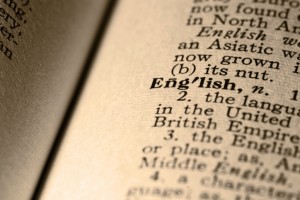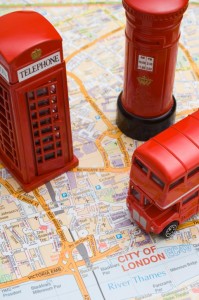 Idioms! Perhaps they are one of the most colourful aspects of language to teach, conjuring up amusing imagery or teaching our students about culture. I had a lot of fun with them in my advanced classes, though found I had to guard against overuse! But a question here for teachers is: which ones to teach? One tends to come across many a student of English who knows the expression “It’s raining cats and dogs,” but I am racking my brains to think of a single time in my life I have heard that idiom in natural conversation.
Idioms! Perhaps they are one of the most colourful aspects of language to teach, conjuring up amusing imagery or teaching our students about culture. I had a lot of fun with them in my advanced classes, though found I had to guard against overuse! But a question here for teachers is: which ones to teach? One tends to come across many a student of English who knows the expression “It’s raining cats and dogs,” but I am racking my brains to think of a single time in my life I have heard that idiom in natural conversation.
Tag Archives: British English
7 English-speaking countries to practise English in this summer
 Summer is here and school is out, so if you’re looking for a way to practice everything you’ve learned in class, why not head overseas to an English-speaking country to practice with the locals? Here are 7 English-speaking countries to practise English in this summer:
Summer is here and school is out, so if you’re looking for a way to practice everything you’ve learned in class, why not head overseas to an English-speaking country to practice with the locals? Here are 7 English-speaking countries to practise English in this summer:
The USA
From the bright lights of bustling New York to the famous drives and boulevards of LA, from the majestic beauty of the Grand Canyon to the Northern Lights across Alaska, the USA offers more than a lifetime’s worth of variety for the visitor. Many of its sights are familiar the world over: the Statue of Liberty, Central Park, the Golden Gate Bridge, the Lincoln Memorial, the Hollywood Sign. So is American English, in all its rich diversity, so if you’re looking to study or improve your language skills this summer, the USA gives you no end of choice. And wherever you go, you’re bound to be given a hearty American welcome and made to feel at home. Continue reading
21 unusual English expressions from around the world
 One of the most enjoyable aspects of learning a language is getting to know its idioms and expressions. Indeed, it’s an area of language where the culture of the speakers can really make itself known. With English spoken in so many places around the world, it’s no surprise that the language has a wealth of entertaining sayings and slang, some funny, some rude, some clever and some bizarre. We’ve picked out 21 unusual English expressions from around the world to give you just a taste of this variety.
One of the most enjoyable aspects of learning a language is getting to know its idioms and expressions. Indeed, it’s an area of language where the culture of the speakers can really make itself known. With English spoken in so many places around the world, it’s no surprise that the language has a wealth of entertaining sayings and slang, some funny, some rude, some clever and some bizarre. We’ve picked out 21 unusual English expressions from around the world to give you just a taste of this variety.
London English from Cockney to Jafaican
 If you’ve ever seen Mary Poppins, you’ll no doubt remember US actor Dick Van Dyke as the cheeky, cheerful chimney-sweep Bert… and his atrocious attempt at a Cockney accent. If you’ve ever seen Sacha Baran Cohen (of Borat fame) perform his Ali G character, then you’ll also have heard a faux ‘Jafaican’ accent. What do Cockney and ‘Jafaican’ have in common? They’re both distinctive London accents. Find out more as we explore London English – from Cockney to Jafaican.
If you’ve ever seen Mary Poppins, you’ll no doubt remember US actor Dick Van Dyke as the cheeky, cheerful chimney-sweep Bert… and his atrocious attempt at a Cockney accent. If you’ve ever seen Sacha Baran Cohen (of Borat fame) perform his Ali G character, then you’ll also have heard a faux ‘Jafaican’ accent. What do Cockney and ‘Jafaican’ have in common? They’re both distinctive London accents. Find out more as we explore London English – from Cockney to Jafaican.
London English from Cockney to Jafaican
Although Received Pronunciation – the standard English accent that you’ll hear in many film adaptations of Jane Austen novels, as well as in many English language coursebook listening exercises – grew out of London and the surrounding counties, the English of the city is characterised more than anything by a mixture of distinctive accents. Londoners can guess pretty well, just by hearing a fellow Londoner speak, if that person is from south or north of the River Thames, or from the East End of the city or the west. Continue reading
RP or Received Pronunciation – the characteristically British accent
 The Queen’s English? BBC English? The English of Professor Higgins in My Fair Lady? For many learners of English, standard British English is synonymous with one of the three. However, the accent that most people think of as ‘quintessentially British’ is actually known as RP – Received Pronunciation. It is widely recognised and often used as a model for teaching English as a second language, as well as serving as the basis for pronunciation guides of British English in dictionaries. We look at Received Pronunciation – the characteristically British accent.
The Queen’s English? BBC English? The English of Professor Higgins in My Fair Lady? For many learners of English, standard British English is synonymous with one of the three. However, the accent that most people think of as ‘quintessentially British’ is actually known as RP – Received Pronunciation. It is widely recognised and often used as a model for teaching English as a second language, as well as serving as the basis for pronunciation guides of British English in dictionaries. We look at Received Pronunciation – the characteristically British accent.
Only an estimated 3% of the population speak with an RP accent, mostly in England. Unlike other varieties of English, such as Scouse in Liverpool, Geordie in Newcastle and MLE (Multicultural London English), RP is not identified with a particular region of the UK, although it is broadly similar to the English spoken in the South East. It is widely considered to be ‘standard’ English and tends to be thought of as ‘educated speech’. Continue reading
Differences between British and American English
 It has often been said that the UK and the USA are ‘two nations separated by a common language’. It’s certainly true that sharing English often disguises the cultural differences between the two societies, but what about actual differences between British and American English? Although there are very few differences, aside from differences in pronunciation, that would leave a Brit and an American in a state of mutual unintelligibility, there are significant differences between British and American English that are worth being aware of. Here we look at some of them.
It has often been said that the UK and the USA are ‘two nations separated by a common language’. It’s certainly true that sharing English often disguises the cultural differences between the two societies, but what about actual differences between British and American English? Although there are very few differences, aside from differences in pronunciation, that would leave a Brit and an American in a state of mutual unintelligibility, there are significant differences between British and American English that are worth being aware of. Here we look at some of them.

